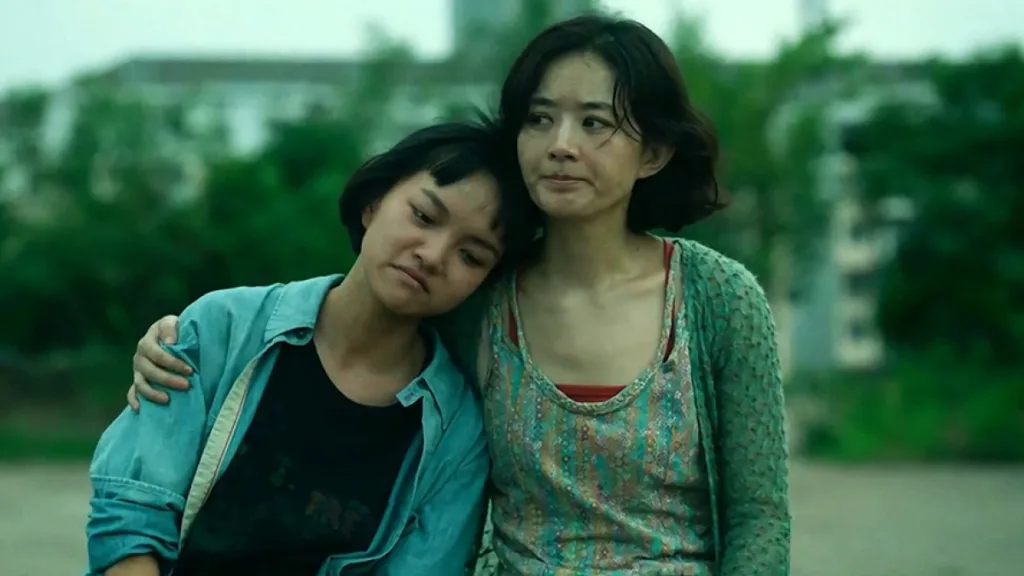Feng Xiaogang’s drama We Girls opens not with freedom, but with the stark confines of a Chinese prison. The film presents a story about what happens after the sentence is served, tracking two women who attempt to reenter a society that offers little clemency.
We first meet Gao Yuexiang, a single mother whose crime was a desperate act of maternal devotion; she performed strip shows online to afford a cochlear implant for her hearing-impaired daughter. Her complicated motivations set the stage for the film’s exploration of moral ambiguity. Inside, she meets Mao Amei, a young deaf-mute woman who was groomed to be a pickpocket by a local crime syndicate.
Because Gao knows sign language, she is assigned to be Mao’s translator and protector. A fragile pact is formed, one that will be tested by the unforgiving world outside the prison walls, where social stigma and economic hardship await them. Their release poses the immediate question of whether a bond forged in captivity can provide shelter from the storm of true life.
A Complicated Sisterhood
The film’s emotional weight rests entirely on the central friendship, a relationship that shifts its shape with the characters’ circumstances. What begins as a protective, almost maternal dynamic in prison transforms into a tense partnership of equals on the outside. Zhao Liying imbues Gao Yuexiang with a restless, pragmatic energy.
Her morality is fluid, bending to the immediate need for money, and her frustration with their slow progress is palpable. Gao is a survivor whose methods are often questionable, creating a character portrait that resists easy sympathy. Opposite her, Lan Xiya gives a performance of quiet force as Mao Amei. She communicates a lifetime of hardship and a deep well of resilience through her expressions and physicality alone.
The screen presence of both actresses creates a potent chemistry, grounding the film’s more fanciful plot turns in something believable. The friction between them—Gao’s aggressive pragmatism against Mao’s quiet hope for a clean break—gives their alliance a welcome texture, preventing it from becoming a simple ode to female solidarity.
Grit and Melodrama
Director Feng Xiaogang constructs the film from two opposing cinematic impulses. The visual language often favors a raw, observational style. Shaky, handheld camerawork follows the women through cramped dormitories and the chaotic streets, acting as a nervous witness to their precarity.
This technique gives their struggle an immediate, documentary-like feeling, particularly in scenes showing their search for menial jobs or their life in a condemned building on the city’s margins. This verité approach, however, collides with the script’s affection for narrative shortcuts and sentimental excess. The contrivance of the women being released on the exact same day is an early sign of the story’s reliance on convenience.
The mood can shift abruptly; a moment of genuine, frightening tension might dissolve into a scene of manufactured warmth. Slick, colorfully lit flashbacks detailing the allure of past crimes stand in stark opposition to the drab reality of their consequences, further contributing to a distinct tonal imbalance.
The Architecture of Rehabilitation
We Girls depicts a world where the punishment of prison is followed by the punishment of a society unwilling to forget. The protagonists face constant reminders of their status through workplace prejudice and institutional distrust. The rehabilitation system is embodied by Deng Hong, a prison officer who offers aid.
Her sympathy is genuine, yet she operates within a rigid hierarchy, practicing a “tough love” that keeps the women tethered to her authority. They exist in a limbo between state control and personal freedom. The film presents a vision of the prison itself that feels curiously pristine, an orderly place of reform where inmates bond through art therapy.
This idealized depiction of the carceral state sits uneasily with the harshness the women face upon release. It suggests a story of second chances that is complicated by its own narrative choices. A late-film revelation reframes the central relationship, making the entire emotional foundation feel suddenly and strangely insecure.
“We Girls” is a Chinese crime drama directed by Feng Xiaogang. The film follows a group of female prisoners who are rebuilding their lives after being released from prison. The movie was released in China on April 4, 2025. It became available for online streaming on major platforms such as Tencent, iQiyi, Youku, and Mango TV starting May 23, 2025.
Full Credits
Director: Xiaogang Feng
Writers: Xiaogang Feng, Longlong Xia, Chong An
Producers: Yi Zuo
Cast: Liying Zhao, Xiya Lan, Ni Chuai, Ju Wang, Xiao Cheng, Xiaoyu Wang, Yi Qian
Director of Photography (Cinematographer): Florian Zinke
Editors: Fan Zhaoshuo
Composer: Wang Qianting
The Review
We Girls
While We Girls is anchored by two powerful lead performances and a raw, observable honesty in its best moments, the film's structural integrity fails. Its reliance on melodrama and convenient plotting clashes with its gritty aesthetic, creating a tonally confused experience. The story of resilience is unfortunately sabotaged by its own narrative choices, leaving a sense of profound hollowness where there should be emotional payoff.
PROS
- Strong, dedicated performances from leads Zhao Liying and Lan Xiya.
- Potent on-screen chemistry that forms a believable central bond.
- Effective handheld cinematography that captures a sense of realism.
CONS
- An uneven tone that shifts jarringly between grit and sentimentality.
- A script built on implausible conveniences and contrivances.
- A late-story development that undermines the characters' shared history.
















































